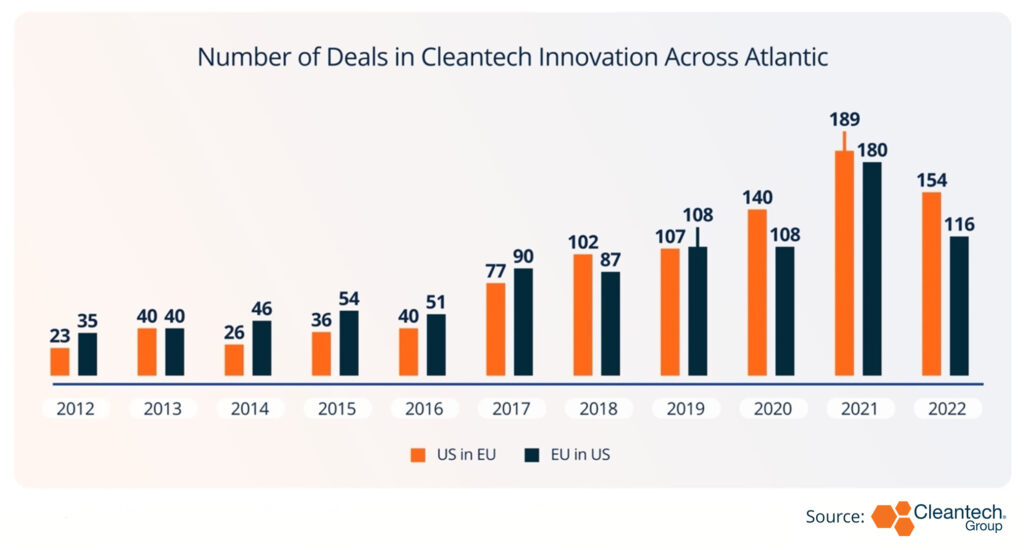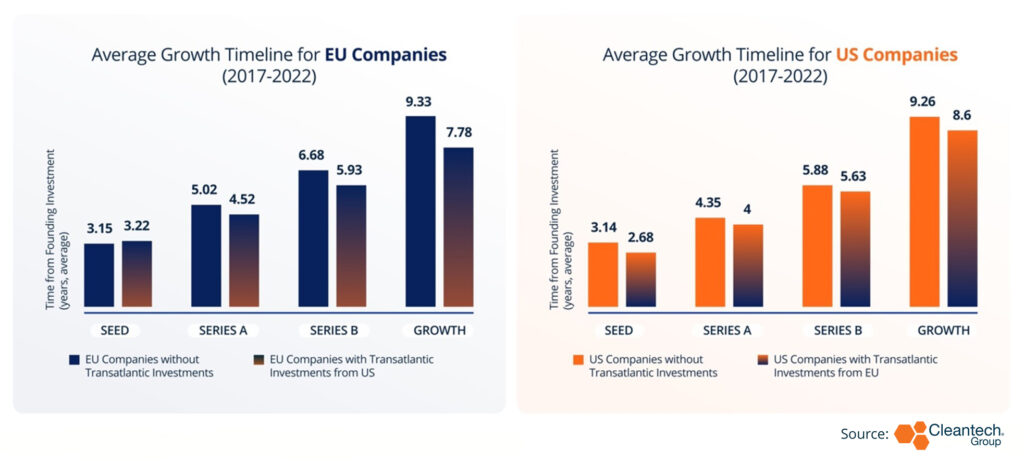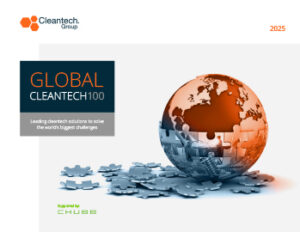Moving Towards a Green Transatlantic Marketplace
The urgent need to transition to a more sustainable economy in the face of the intertwined climate and energy security crises has prompted the U.S. and the European Union (EU) to prioritize cleantech initiatives. However, to remain competitive, transatlantic cooperation among stakeholders – including start-ups, venture capital funds, large corporates, and policymakers – is crucial.
In Cleantech Group’s recent complimentary report, “Transatlantic Cleantech Investment: Towards a Green Transatlantic Marketplace,” we provide an overview of the state of transatlantic cleantech collaboration, highlight opportunities for improvement, and examine potential barriers. Additionally, we offer concrete recommendations for the U.S. and EU policymakers to help advance transatlantic collaboration and accelerate the transition to a green economy.
Report Approach
The research methodology for this study involved using proprietary data from Cleantech Group’s i3 database to gain insights through discussions with key players in innovation and policy in the U.S. and the EU. These discussions included engagements with risk capital providers, ecosystem developers, demand-side representatives, and policy experts.
Notable investors with transatlantic portfolios who were interviewed included Princeville Capital, Plug and Play, Breakthrough Energy Ventures, Prelude Ventures, Energy Impact Partners, and Chrysalix in the U.S., as well as EIT InnoEnergy, AP Ventures, Eurazeo, Future Positive Capital, and Systemiq in Europe. Valuable insights were also obtained from demand owners representing prominent organizations with a strong interest in innovation, such as The Energy Resilience Leadership Group, First Movers Coalition by the World Economic Forum, C40 Cities, and Mission Innovation.
Investment data, specifically deal count and volume, was collected and filtered to focus on venture capital deals at various stages (Seed, Series A, Series B, and Growth). Our analysis specifically targeted companies based in the EU that had received investments from at least one investor headquartered in the U.S., and vice versa (i.e., U.S. companies with at least one EU-based investor). Deals involving at least one transatlantic investor were classified as transatlantic deals for the purposes of this report.
Transatlantic Dealmaking Findings
According to our data, investors in the U.S. and EU are increasingly interested in transatlantic dealmaking. U.S. investors participated in twice as many EU cleantech deals in 2022 than in 2017, while EU investors participated in ~30% more deals in the same timeframe. The number of U.S. investments in EU cleantech deals doubled, and the size of these deals rose 10 times; in the EU the size of deals rose 3 times (see Figure 1).
Figure 1. Number of Cross-Atlantic Deals in Cleantech Innovation
Companies with transatlantic investments tend to have faster timelines to reach growth scale and receive growth funding. According to our research, EU companies without transatlantic investments take an average of 9.3 years to receive growth funding (see Figure 2). This is 20% longer than the time it takes for EU companies that have received at least one investment from a U.S. investor. U.S. companies, on average, grow faster than their EU counterparts but they also benefit from transatlantic investments and have a slightly shorter growth period.
Figure 2. Average Growth Timeline for EU & US Companies
This increased investment is mutually beneficial: U.S. investors are providing much-needed growth capital to EU companies, which are struggling to find sufficient funding from local investors to scale up. The involvement of U.S. investors is correlated to positive outcomes for EU cleantech companies, such as accelerated growth and funding timelines and larger investment rounds. Meanwhile, large corporations from the EU are actively investing in U.S. innovators, driving innovation and demand for their products.
Despite the increasing focus on cleantech innovation and policy on both sides of the Atlantic, significant gaps exist in transatlantic cleantech cooperation. While the U.S. and EU are investing considerably in cleantech R&D, coordination between their R&D agendas is lacking. Improved coordination among governments could lead to faster innovation breakthroughs.
Cross-border investment suffers from administrative barriers, as investors have to understand and comply with differing practices and legal obligations pertaining to various aspects such as term sheets, fiduciary duties, and employment contracts. This is exacerbated by inherent policy complexity and increasing policy divergence between the U.S. and EU, both of which have implemented novel financial and industrial policies.
One example is the EU’s sustainable finance framework, which over the past few years has created a number of new disclosure requirements for investors aimed at promoting sustainable investments. These disclosures, though burdensome and complex, are designed to enhance transparency, enable informed decision-making, and encourage responsible investment practices.
The voice of cleantech innovation is currently absent from transatlantic policy discussions. There is no place for cleantech innovators and investors to inform and exchange views with U.S. and EU officials. Facilitating regular and structured communication between the innovators and policymakers will help identify ripe areas for federal investment and remove barriers to cross-border investment. Finally, demand owners, such as large corporations, lack access to an overview on transatlantic deal-flow and do not yet benefit from a green transatlantic marketplace.
Transatlantic Investment Recommendations
To further accelerate transatlantic collaboration and leverage existing strengths, we recommend the following actions be taken:
- Harmonize policies, incentives, and standards to scale cleantech on both sides of the Atlantic.
Achieving a green transatlantic marketplace requires reducing policy divergence and aligning standards on key clean technologies. Harmonizing policies, incentives, and standards can help create a level playing field for businesses on both sides of the Atlantic, thereby reducing uncertainty and increasing investment in the sector, building larger transatlantic markets for new solutions, and promoting sustainable economic growth and competitiveness.
- Mobilize cleantech leaders in regular dialogues with policymakers to convey needs and opportunities.
To accelerate the adoption and deployment of cleantech solutions, it is essential to promote regular dialogue between cleantech leaders, including investors, innovators, and policymakers. Such dialogue can help convey the needs and opportunities of the cleantech industry and facilitate the development of supportive policies and programs. Bringing together cleantech leaders and policymakers can help to identify financing gaps and develop strategies to address them, thereby promoting sustainable economic growth and competitiveness.
- Engage demand owners and innovators to facilitate transatlantic deal-making and scale-up.
Involving demand owners, such as large corporations, can help policymakers and risk capital providers better understand the needs of potential customers and the market demand for cleantech solutions. At the same time, demand owners can benefit from access to the latest innovations and technologies in cleantech, which can help them meet their sustainability goals and reduce environmental impact.
To read more about transatlantic cleantech and access further information on the topics discussed in this blog post, please visit the Transatlantic Cleantech website.





